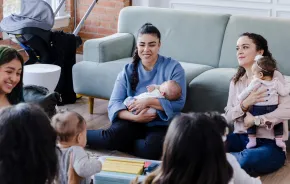The headlines are everywhere:
• Girls between the ages of 9 and 12 are at an increased risk of gaining weight.
• Girls who are overweight during their tween years have a higher risk of obesity, heart disease and diabetes as adults.
• Girls who are overweight often enter puberty earlier.
Gaining weight at this age, when girls are starting to grapple with body image, is not just a physical problem; it is also a social and emotional one. Dr. Bernard Alberda, a Seattle pediatrician, has seen a marked increase in the numbers of his young patients who are overweight and is concerned about the detriment to their mental and physical health.
In terms of self-esteem, Alberda says, “It doesn’t take much … one comment by one person, and it’s downhill.” Body image can be a big issue for girls, but being physically active and getting more exercise — whether through organized sports or independent activities — can help tween and teen girls navigate the passage from childhood to adolescence.
Widespread benefits
According to a 2006 study published in Pediatrics, teens who are physically active are less likely to have sex, smoke, drink or drive drunk, use illegal drugs, miss school or have low self-esteem. At the same time, active kids are more likely to get A’s in math and science, sleep eight hours at night, do housework and have summer jobs.
The Centers for Disease Control recommend that kids and teens get 60 minutes of moderately intense exercise daily. Dr. Alberda seconds the recommendation, believing that kids who are involved in regular exercise through grade school are more likely to continue with healthy habits as they get older. Unfortunately, as schools cut back on recess and physical education, many kids aren’t getting enough exercise.
Tacoma’s Annie Wright School, which is co-ed through eighth grade and girls-only from ninth through 12th, is bucking the trend of less exercise. Students get recess three times a day, physical education three times each week, and swim twice a week. “Every day our kids are getting lots of activity, structured and unstructured,” says Rhondi Adair, the school’s director of athletics.
“I really feel that it’s important that girls get involved with exercise,” Adair says. “Their bodies are changing so much, so quickly, and sports help teach them a healthy lifestyle.” Beyond the physical benefits, Adair says that, in her experience, the confidence girls gain from being involved in athletics helps them in every area of their lives.
The fitness challenge
Some local organizations are stepping up to help. Passages Northwest, now in its 10th year, uses “experiential education” through outdoor challenges to help girls improve their self-esteem, independence and self-confidence. Girls on the Run uses a 12-week curriculum combined with running to advance its mission of improving girls’ health and confidence while directly addressing issues such as peer pressure and personal safety.
In Passages Northwest’s 10-week Girls Rock! program, participants come together to learn rock climbing and meet one-on-one with adult mentors. “It fits into our greater goal to create a cocoon around them of support,” says program director Erica Nixon Mack. “It’s like a Petri dish of girl dynamics. It’s a perfect opportunity to give girls skills in conflict and how to get along.” Mack adds that the all-girl environment helps. Without boys around, says Mack, “they’re a lot more courageous and they build confidence without reservations.”
“My first coaching season … was an amazing experience,” says Girls on the Run’s Kristen Varg. “From the stories the girls would share it was evident that many of them came from difficult environments.”
Varg feared their backgrounds would make it hard for the girls to face adolescence, even with the necessary coping tools. Over the course of the 12-week session, however, “we were able to see the effects of the lessons … the girls became more comfortable with themselves and more eager to participate,” says Varg.
Julia Jones of Seattle has seen firsthand the benefits of exercise for her daughter Stella, now 13. “I believe if the child has a passion, something that they can own, that can get them through a lot,” says Jones. “For us, it’s been sports.”
An avid soccer player, Stella’s interest in athletics and exercise is central to her self-identity. “She sees herself as an athlete,” says Jones. “It helps define her.” That self-image also helps guide Stella to make healthy choices, from food to fashion.
Jones knows that her daughter will face increasing pressures as she enters adolescence. Still, “I feel like she has a really solid base,” Jones says. Stella’s peer group, she observes, is growing up ready to face those pressures. “These girls just seem so strong.”
Jennifer Donahue is a freelance writer. She lives in Kenmore with her husband and two sons.
Resources
Passages Northwest









